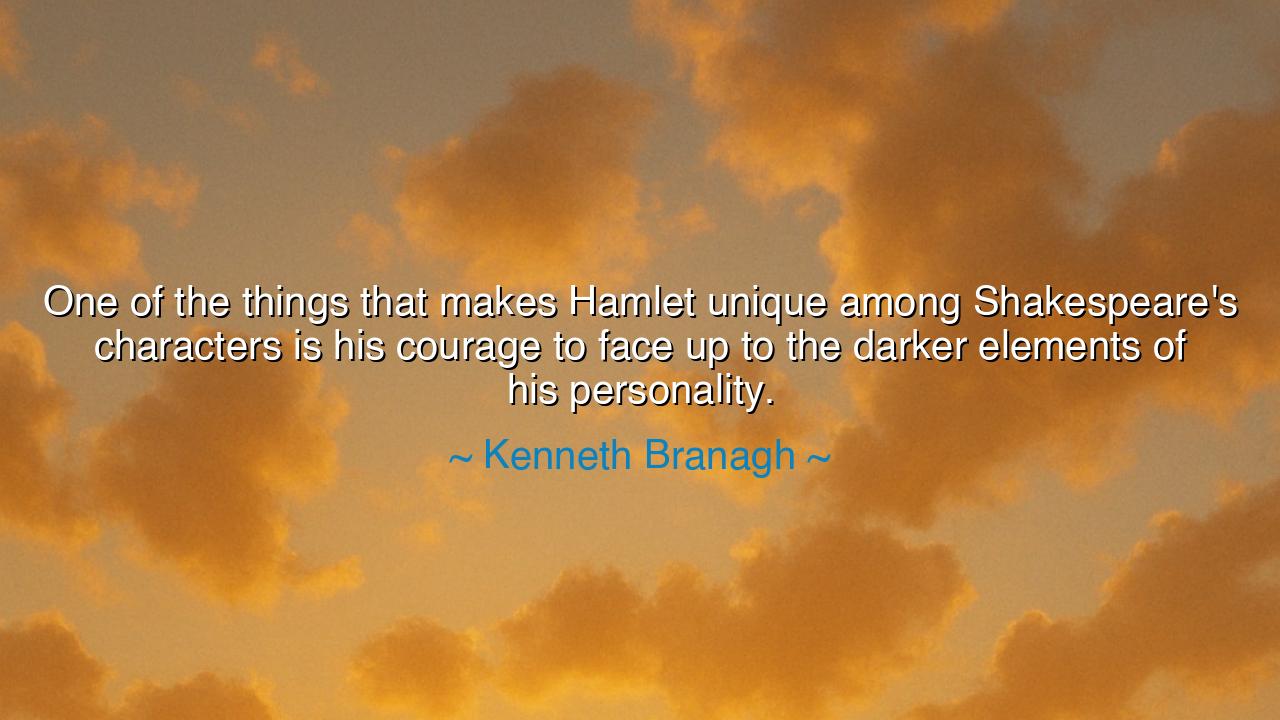
One of the things that makes Hamlet unique among Shakespeare's
One of the things that makes Hamlet unique among Shakespeare's characters is his courage to face up to the darker elements of his personality.






“One of the things that makes Hamlet unique among Shakespeare’s characters is his courage to face up to the darker elements of his personality.” Thus spoke Kenneth Branagh, one of the great interpreters of the Bard, whose insight pierces not merely the art of theatre but the very nature of the human soul. In this reflection, Branagh reminds us that the greatness of Hamlet lies not in his wit, his melancholy, or his eloquence, but in his courage — not the courage to fight an enemy, but the rarer and more terrible courage to confront himself. To look into one’s own darkness without flinching is an act of true heroism, for it is far easier to battle foes in the world than to face the shadows that dwell within one’s own heart.
The origin of this quote lies in Branagh’s lifelong study and portrayal of Shakespeare’s Hamlet, a role he embodied on stage and screen with intensity and reverence. Hamlet, Prince of Denmark, is perhaps the most complex figure in all of literature — a man of intellect and sensitivity, torn between duty and doubt, vengeance and morality. Unlike Shakespeare’s other tragic heroes — Macbeth driven by ambition, Othello by jealousy, Lear by pride — Hamlet’s struggle is inward. His torment arises from the battle within the self, between reason and emotion, light and darkness, action and paralysis. Branagh, who lived through the character’s storms as both actor and director, understood that Hamlet’s greatness lies in his willingness to gaze unflinchingly at the turmoil of his own mind. He does not flee his thoughts, even when they torment him; he seeks truth, even when truth destroys his peace.
When Branagh speaks of “the courage to face up to the darker elements”, he touches the heart of human existence. For within every person lies a duality — the noble and the base, the light and the shadow. Most turn away from their inner darkness, choosing illusion over honesty, comfort over confrontation. Yet Hamlet, though broken by grief and haunted by doubt, refuses this escape. He questions everything — his purpose, his morality, even his sanity. “To be, or not to be,” he asks — and in that eternal question, he becomes not merely a prince, but a mirror for all humankind. His courage is not that of the soldier who fights on the battlefield, but that of the soul who dares to know itself, with all its contradictions and flaws.
This kind of courage is exceedingly rare. It was the courage of Socrates, who questioned his own beliefs and those of his people, and drank the hemlock rather than betray his conscience. It was the courage of Carl Jung, who ventured into the depths of the human psyche and revealed that wholeness is not found in denying the shadow, but in integrating it. And it was the courage of every artist, thinker, and seeker who has chosen truth over comfort. Hamlet stands among them — a symbol of the eternal human struggle to reconcile the divine and the mortal within ourselves. His tragedy is that he sees too clearly; his triumph is that he dares to see at all.
Branagh’s interpretation, then, becomes not just an analysis of a character, but a philosophy of life. He reminds us that the path to wisdom runs through the valley of self-knowledge — that no man or woman can attain peace without first confronting their own shadows. To know one’s darker elements is not to be corrupted by them, but to master them. The coward denies his flaws and remains enslaved to them; the brave acknowledges them and is set free. Hamlet, though he perishes, achieves a kind of victory through self-awareness — for even in death, he stands as one who sought truth rather than illusion.
This truth can be seen throughout history. Consider Abraham Lincoln, who wrestled with melancholy and self-doubt yet turned his suffering into empathy and resolve, guiding his nation through its darkest hour. He, like Hamlet, bore the weight of his own shadow, but did not let it consume him. Instead, he transformed his pain into wisdom, his self-doubt into humility, his sorrow into strength. Such is the alchemy of courage — that by facing one’s darkness, one becomes a bearer of light for others.
So, dear listener, take this teaching as a lamp for your own journey: Do not fear your shadows. Within them lies the map of your humanity. To ignore your flaws is to live in blindness; to face them is to live in truth. Be as Hamlet, who though tormented, sought clarity; be as Branagh, who saw in Hamlet not weakness, but bravery. Look inward and ask, “What do I fear within myself?” — and then, do not turn away. For the soul that dares to confront its own darkness earns not only wisdom but freedom.
As Kenneth Branagh teaches through the words of Shakespeare’s greatest creation, the noblest battle is the one fought within. Those who have the courage to face their darker elements become the masters of their fate. For it is only by embracing the whole of oneself — light and shadow alike — that one can truly rise to greatness and live with both depth and peace.






AAdministratorAdministrator
Welcome, honored guests. Please leave a comment, we will respond soon